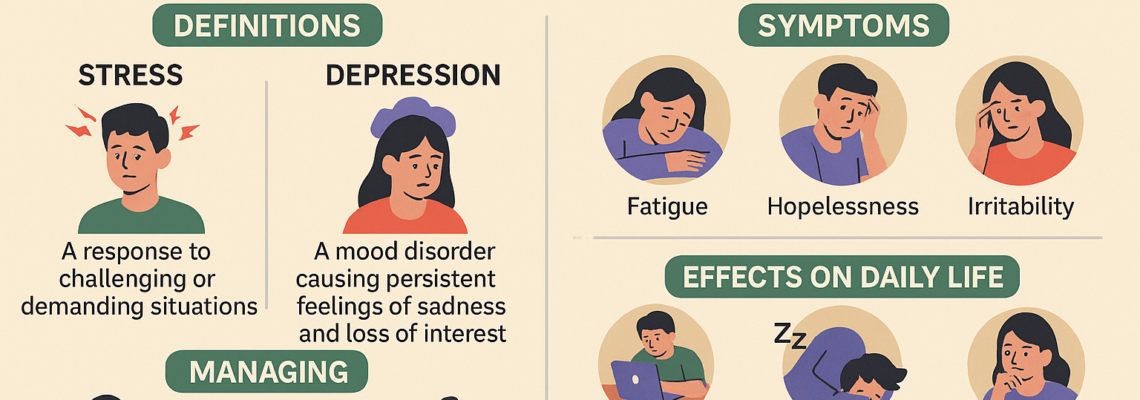
Difference Between Stress and Depression in Pakistan
- May 10, 2025
- 0 Likes
- 6753 Views
- 0 Comments
Understanding the difference between stress and depression in Pakistan is important. Many people confuse these two conditions. Stress and depression may feel alike, but they have different causes, symptoms, and treatments. Knowing the difference helps people get the right help when needed.
What is Stress?
Stress is a normal reaction to everyday problems like work, school, family, or money. When you’re stressed, your body releases hormones to help you handle difficult situations. In Pakistan, stress is common due to issues like traffic, workload, family demands, and financial concerns. Usually, stress goes away when the problem is solved.
Common stress symptoms include feeling worried, headaches, irritation, trouble focusing, and sleep issues. Small amounts of stress are normal, but long-term stress can lead to health issues like high blood pressure or anxiety. Managing stress is important. Activities like exercise, prayer, or talking with someone can help reduce stress.
What is Depression?
Depression is a serious mental health issue that affects your mood and actions. It makes you feel very sad, hopeless, and uninterested in things you once enjoyed. In Pakistan, depression is increasing due to financial problems, loneliness, relationship troubles, and limited access to mental health care.
Depression symptoms include constant sadness, low self-worth, changes in appetite, feeling tired, and thoughts of harming oneself. If these feelings last more than two weeks, it’s important to seek help. Depression is treatable, and early treatment can improve your life significantly.
Key Differences Between Stress and Depression
Duration and Intensity
The main difference between stress and depression in Pakistan is how long the symptoms last. Stress usually ends quickly when the problem goes away. Depression lasts much longer and can continue for months or years without treatment. Stress has milder feelings, while depression causes intense emotional pain.
Causes and Triggers
Stress comes from temporary problems like exams, job deadlines, or family arguments. Depression often starts without a clear cause. It can come from ongoing stress, trauma, or genetics. Recognizing these triggers helps manage mental health better.
Physical and Emotional Symptoms
Another clear difference between stress and depression in Pakistan is the type of symptoms. Stress often involves physical issues like headaches or muscle aches. Depression mainly causes emotional issues like ongoing sadness, loss of interest, and feeling disconnected.
Effect on Daily Life
Stress can temporarily affect your mood but usually doesn’t stop daily tasks. Depression greatly affects your ability to work, study, and maintain relationships. Simple tasks become difficult when you’re depressed.
Stress and Depression in Pakistani Culture
In Pakistan, there’s a stigma around mental health issues like stress and depression. People avoid discussing their feelings due to fear of judgment. Pakistani culture emphasizes strength, patience, and family honor, making it harder to openly discuss mental health.
However, attitudes are changing. Young people in Pakistan are becoming more open to discussing mental health. Schools, workplaces, and social media are also raising awareness. This helps people feel comfortable talking about mental health and seeking help.
Managing Stress in Pakistan
Managing stress in Pakistan involves easy, practical steps. Regular physical activity, like walking or cycling, helps reduce stress. Prayer and meditation, common in Pakistan, also help manage stress effectively. Eating healthy, sleeping well, and spending time with family and friends improve mental well-being.
Talking to someone about your stress, like friends, family, or religious leaders, can offer valuable support. Managing stress early prevents it from becoming anxiety or depression.
Seeking Help for Depression in Pakistan
Depression requires professional support. If you or someone you know shows signs of depression, see a mental health professional. Pakistan has psychologists, psychiatrists, and counselors trained to help through therapy or medication.
Many cities offer mental health services in hospitals and private clinics. Online platforms like UMEED provide confidential support for depression. You can take a quick depression test to check for early signs. Getting help early improves both mental and physical health.
Common Misunderstandings About Stress and Depression
A common misunderstanding is that depression is just severe stress. Stress and depression are different conditions. Another misconception is that only weak or lazy people get depressed or stressed. The truth is anyone can experience these issues, regardless of their strength or character.
These misunderstandings can prevent people in Pakistan from seeking necessary treatment. Educating others about the difference between stress and depression in Pakistan reduces stigma and encourages getting help.
Why Understanding the Difference Matters
Knowing the difference between stress and depression in Pakistan matters because they need different treatments. Stress management involves lifestyle changes and support from others. Depression usually needs professional help, therapy, or medicine.
Understanding these differences helps recognize symptoms early and encourages timely help. It also helps create a more supportive and understanding society.
You Are Not Alone
If you or someone you care about struggles with stress or depression, support is available. UMEED provides access to mental health professionals who understand Pakistani cultural and social challenges. Early help greatly improves recovery.
By knowing the difference between stress and depression in Pakistan, you empower yourself and others. Mental health matters, and seeking help shows strength.
Contact for Professional Support
If you need help or more information, reach out:
Website: https://umeed.com.pk/
Contact Number: 0343 6004992 (available 24/7)
Email Support: [email protected]
You don’t have to face stress or depression alone. Help is confidential and easy to access. Take the first step today.
